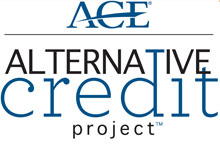"Around the College" is no longer being updated.
View current SUNY Empire Stories.
October 22, 2015
SUNY Empire State College Participates in National Alternative Credit Project

SUNY Empire State College students have another avenue of access to degree completion, thanks to the college’s participation in the American Council on Education’s (ACE) Alternative Credit Project.
According to ACE, the primary goal of the project is to “…boost the ability of millions of nontraditional learners to gain a degree.”
SUNY Empire students may select, and the college will accept credit from, among more than 100 low- or no-cost, lower-division, online courses in:
- business
- critical thinking, writing and communication
- foreign languages
- humanities
- mathematical concepts
- science
- social and behavioral science
- technology.
The 111 low- or no-cost, lower-division general education online courses were submitted by a group of non-accredited course providers chosen to participate in the Alternative Credit Project.
Course formats include self-paced, instructor-led and courses with a mentor. Many courses combine formats.
The college will share and receive anonymized data with ACE and the other institutions participating in the project, including the number of credits accepted, progress and rates of success for students transferring approved courses, which will inform all the college does to support student success.
The college’s 20,000 students and 77,000 alumni fit many characterizations and definitions of nontraditional learners.
Most of the college’s students are 25 to 55 years old. They are enrolled in degree programs, have a job, career, family and community commitments and learn part time as they study to complete their degrees.
Since its founding in 1971, the college has provided students with the opportunity to earn credit for their college-level learning through its individualized prior learning assessment process and professional learning evaluations.
The college also accepts credit recommendations from ACE, the National College Credit Recommendation Service and from standardized exams offered by a number of nationally recognized organizations.
The project is made possible by a $1.89 million grant from the Bill and Melinda Gates Foundation.
